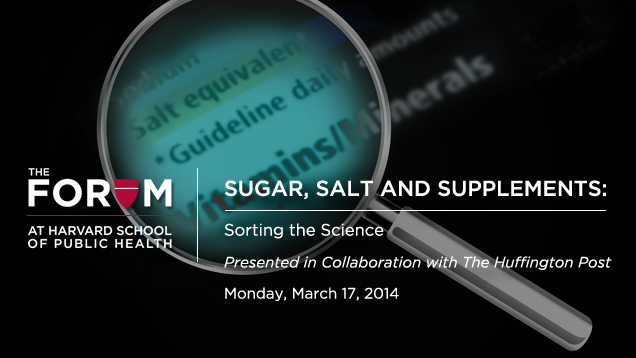
Photo: ©iStockphoto.com/rambo182 and ©iStockphoto.com/BrianAJackson
This panel was presented at The Forum at Harvard School of Public Health in collaboration with The Huffington Post.
When it comes to sugar, salt and supplements, how much do you actually know? On Monday, March 17, HuffPost Healthy Living Senior Editor Amanda Chan joined leading experts in nutritional science at the Harvard School of Public Health to discuss how much sugar and salt we should really be consuming each day and to clear up the confusion surrounding popular vitamins and supplements and their health benefits (or lack thereof).
The experts in the discussion included Dr. Dariush Mozaffarian, Associate Professor in the Division of Cardiovascular Medicine, Brigham and Women's Hospital and Harvard Medical School, and Associate Professor in the Department of Epidemiology, Harvard School of Public Health; Dr. JoAnn Manson, Chief, Division of Preventive Medicine, Brigham and Women's Hospital, and Professor in the Department of Epidemiology, Harvard School of Public Health; and Dr. Frank Hu, Professor of Nutrition and Epidemiology, Harvard School of Public Health, and Professor of Medicine, Harvard Medical School and Channing Lab, Brigham and Women's Hospital.
The discussion emphasized the importance of knowing how much sugar is in foods. Hu noted that Americans typically consume 15 percent of daily calories from sugar, even though the World Health Organization has proposed changing guidelines for sugar consumption to just 5 percent of daily calories. And not all sugar is alike -- sugar from fruit takes longer to digest, meaning it doesn't cause spikes in blood sugar levels, unlike added sugars. Mozaffarian also noted our bodies experience blood sugar spikes when we eat refined grains, yet most people don't see refined grains and sugar as the same thing.
The necessity of taking vitamins for those who aren't deficient in any nutrients is also a confusing topic for many Americans. Recent U.S. Preventive Services Task Force recommendations say there doesn't seem to be enough evidence to recommend taking multivitamins or single- or paired-nutrient supplements for preventing cancer or heart disease, and the panel actually recommends against taking beta-carotene or vitamin E supplements for purposes of preventing heart disease and cancer. Manson noted that supplements have a role for people who are deficient in nutrients, but a lot is still unknown in terms of the benefits reaped by someone who's not deficient in nutrients. Ultimately, she says that the best way to get nutrients is by eating healthfully.
There is a clear need for solutions, and the panelists agreed that no one single method can effectively help people improve their diets. They noted that a combination of education -- informing people what's really in their food -- and policy -- whether it involve taxes on sugary drinks, restrictions on serving sizes or rules about what foods can be bought using government assistance -- is necessary to get people to really change their eating habits for the better.